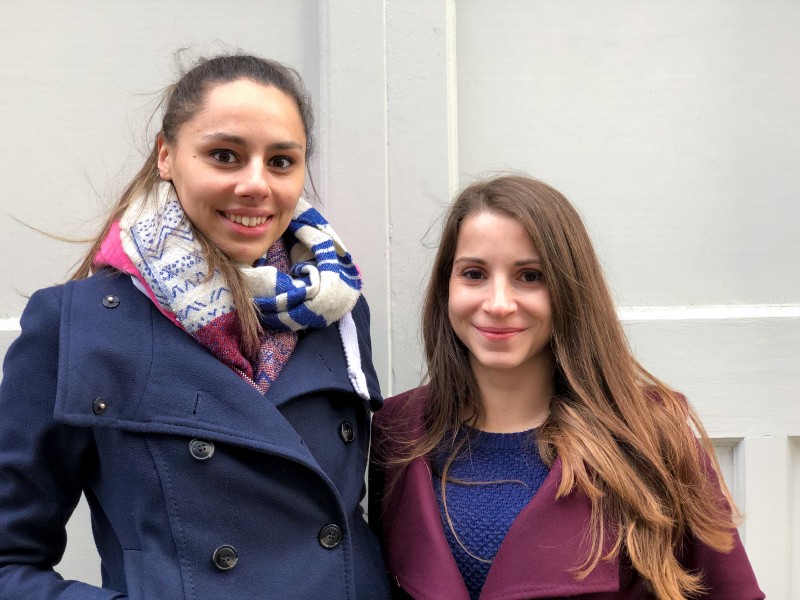by Rebecca Radding
How two friends changed careers, learned to code, and built a startup
Katerina Pascoulis and Ruth Uwemedimo talk about what they learned from freelancing and why they love working together at Personably
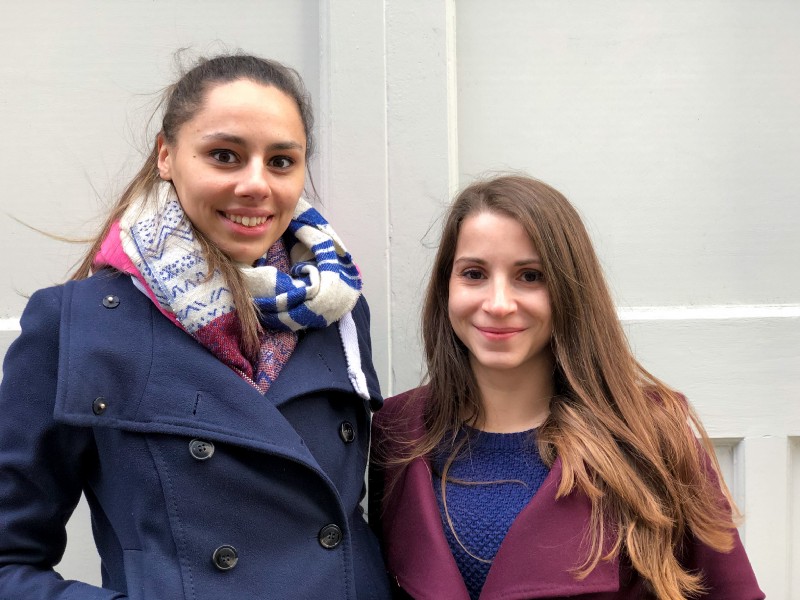
In 2016, Ruth and Katerina left jobs at Foxtons and Crowdcube, respectively, to join the sixth cohort of Founders and Coders, a peer-led web development training programme in London. After the course, they worked as freelancers, building MVPs for non-technical founders, before going their separate ways: Ruth joined the development team at JustGiving and Katerina co-founded Personably. In December 2017, Personably raised £500,000 of venture capital and hired Ruth as its first employee.
Rebecca: Ruth and Katerina, thank you so much for making time to chat with me. Katerina, you’ve written about how studying law helped you with programming and how you learned to code in a “scarily short space of time”, so let’s start with Ruth. Could you tell us a bit about your journey?
Ruth: Of course! I studied maths and philosophy at university but wasn’t sure what I wanted to do afterwards. I took the job at Foxtons because selling houses sounded like fun and I wanted a car. After a year, I left Foxtons and started looking for a new job. I thought it might be exciting to work at a startup, and saw lots of listings for developer roles, like front-end developer and full-stack developer. I thought to myself, what’s this all about, and what’s the difference between these roles?
I looked into learning to code and read about paid bootcamps, but as I wasn’t sure it would be for me, I wasn’t ready to commit to something so expensive. Finally I read an article in the Guardian where Dan talked about Founders and Coders, and thought, “hmm… a free, peer-led programme? I need to learn more about this!”. I met Dan in Bethnal Green (our home until the move to Finsbury Park in 2018) and he took me for a walk around Mile End park. By the time we got back to the space I knew I wanted to apply.
Rebecca: Katerina, you’ve told me you wanted to code so you could build things yourself. Tell me about your experience learning to code in a peer-led environment at Founders and Coders.
Katerina: At Founders and Coders, not knowing how to do something was just the start of the process of figuring it out as opposed to the end. I learned to use the internet to help me ask the right questions and then identify who to ask or where I could find the answers. I think being in an environment where things are spoon fed to you doesn’t give you that skill. It was my main issue with tools like Codeacademy, when learning to code. It doesn’t push you to search for answers when you get stuck so it was hard for me to push myself past a beginner stage.
Rebecca: Ruth, could you tell me a bit about your experience on the course?
Ruth: Doing the course confirmed for me that I loved coding and that I wanted to work as a developer. I also fell in love with the community at Founders and Coders, in particular how everyone is so willing to help each other learn and improve their coding skills.
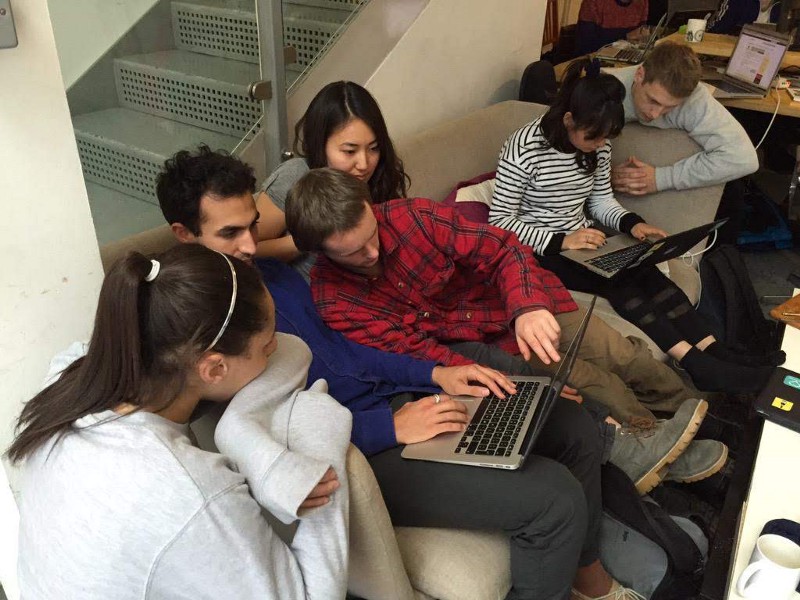
Rebecca: Do you remember when you realised you wanted to make a career out of coding?
Ruth: It must have been about two or three weeks in, I was really enjoying the course, and I just knew - this is what I want to do. People look at code and think “oh my gosh, I’m never going to learn that”, so when you do understand it, it’s like, “I can’t believe I really understand this”. Also, being able to write some code that contributes to producing something tangible, something people can use - it’s an extraordinary feeling.
Rebecca: You mentioned being struck by the willingness of people at Founders and Coders to help each other. Was there a time when someone went out of their way to help you?
Ruth: A couple of days a week, for the first half an hour, someone from the previous cohort would lead what we call a “morning challenge.” I remember Nikki doing a challenge on ES6, which had just come out, and she was talking about destructuring, which of course I now find so easy! I had just learned how to access properties inside objects in ES5, and couldn’t wrap my head around ES6. It felt like everyone else understood but me, but no matter how many questions I asked, Nikki happily made time to respond to all of them.
Throughout the course we got a lot of support from recent graduates and alumni working in the space. I think the best thing about having past cohorts teach the current cohort is that the previous cohort has so recently been in the position of the new cohort, where they’re struggling to understand how a simple piece of code works, so they can easily relate. Sometimes I think much more experienced coders can forget what it’s like to be a beginner.
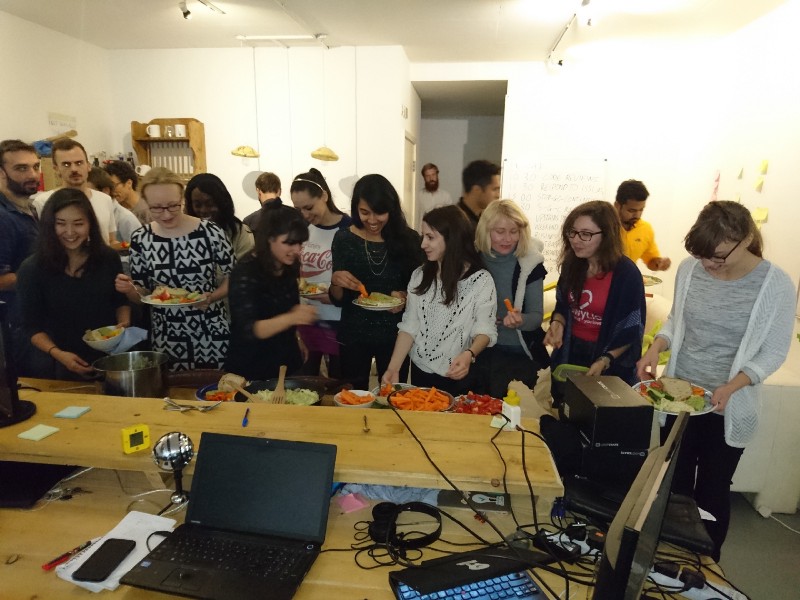
Rebecca: What was it like when you became a mentor yourself?
Ruth: I suggested introducing testing as a topic for the next cohort, as we hadn’t studied it explicitly on our course but I thought it was so valuable we should probably dedicate a week to it. With a partner, I led that week, and I loved sharing all the things I had recently just learnt with other people who wanted to learn the same thing! I also found that it consolidated all of my learning as I had to really understand it to be able to teach it.
Katerina: When Ruth started at Personably, she started digging into the code, and one of the first things she said was, “where are all the tests?” To be fair, we had some - just not enough. So putting in more tests became one of her first projects, and now we have a really good testing infrastructure and everything is much more stable.
Rebecca: Tell me about the projects you worked on together at Founders and Coders.
Ruth: The first time we worked together was on an MVP for an app called Causr. Katerina was a great project manager for it!
Katerina: Ruth’s being generous there - I didn’t scope that project well and we basically ended up building Tinder for business with location matching in three weeks. Learning how to scope projects was trial by fire. Really that should have been a three-month project with a budget to match, not a three-week one!
I realised that something being end-of-week-project-ready on the course was not the same as customer-in-production-ready. When you build something on the course, you might not finish the last twenty percent, which is fine, but for a client, those finishing touches take so much longer than you expect! You have to factor that in when you’re agreeing pricing or you can end up working for less than minimum wage.
Ruth: Our later projects went much more smoothly!
Katerina: I tried to pass that on to the next cohorts, coaching them on the kinds of things they should take on and also what to watch out for (such as early stage companies wanting lots of work but not being willing to pay anything for you to do it). I’ve been back a few times to speak on a similar topics.
At Crowdcube, I worked with early stage founders looking for funding, which meant I was in a position to contribute back to Founders and Coders by finding new graduates freelance projects and handling things that came inbound.
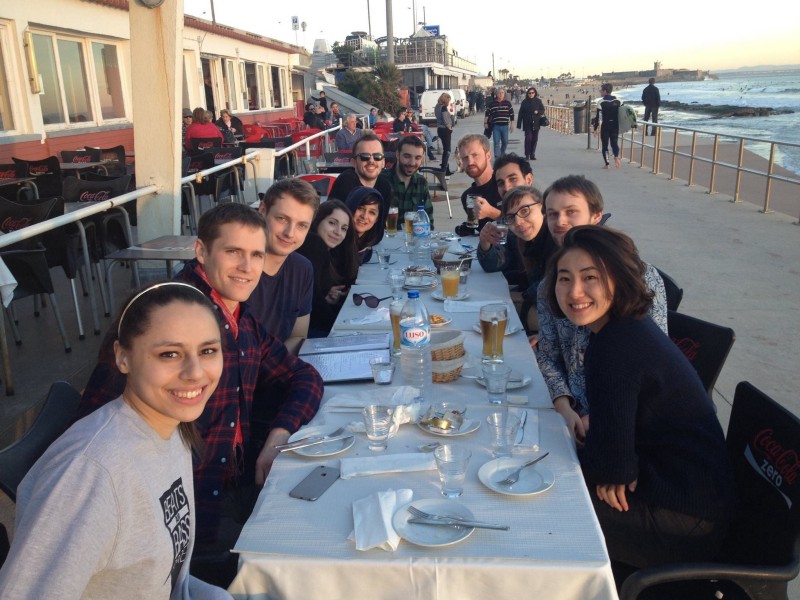
Rebecca: Any advice for prospective freelancers reading this interview?
Katerina: A lot! To start, make sure you have a clearly defined project scope for what you’re going to deliver within the time frame you’ve set, and link payment to those deliverables. That way, if the client requests something later that wasn’t in the original scope, you can charge more for the additional time. It also helps avoid “feature-creep”, when the client asks for “just one more thing,” several times over!
Also, it’s been said elsewhere but it bears repeating: if you’re building an MVP, pare down what the client is asking for to the most basic version. If your client says, “hey, our users need to be able to send messages, so can you build an in-app messaging service”, take a step back and explore whether you might be able to get the same functionality using Twilio or an API using someone else’s client.
Rebecca: Ruth, what did you learn from freelancing and how did it help you decide what to do next?
Ruth: In total, I freelanced for about a year after finishing Founders and Coders. Katerina and I worked together on projects for Juno (automating conveyancing), Causr (network with people around you), Piccnicc (Deliveroo but for airports), and WCRS. I also did several shorter projects with other people at Founders and Coders that lasted from one week to one month.
There are pros and cons to being a freelancer, but overall I liked it. Freelancing allowed me to work with lots of different technologies to figure out which ones I liked best before starting something permanent. It also helped me gain the experience and confidence I needed to get a full time role. Also, since you manage your own time, if you want to go on holiday, you can!
On the other hand, you always have to worry about finding your next project. The longest gap I had was five weeks, which is quite a long time to go without income. Luckily I was living at home at the time, so I didn’t have to worry about rent, but if you do it’s even more stressful.
Katerina: When you’re a more senior developer, you can charge a day rate anywhere from £400 - 1000, which is high enough to account for days when you’re not getting paid, but as a junior it’s hard because £150/day doesn’t leave much leftover, especially in an expensive city like London.
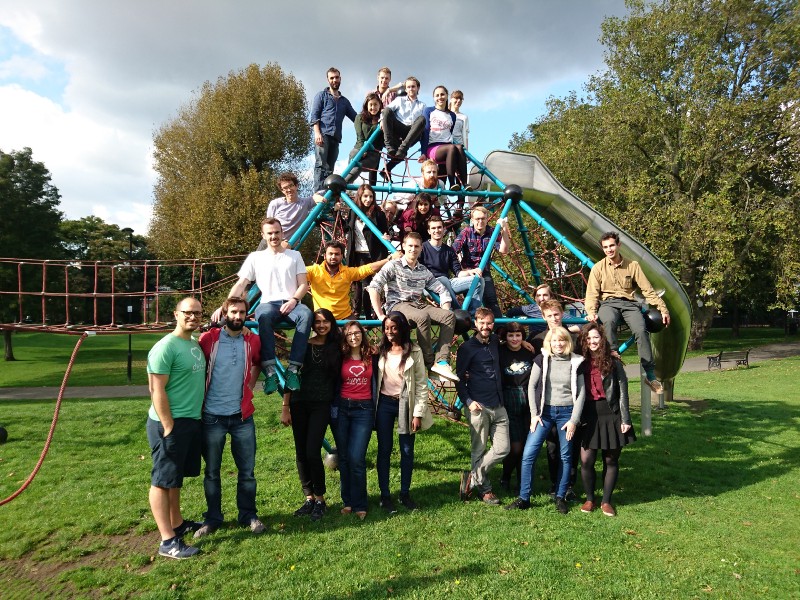
Rebecca: Ruth, I’d love to hear about your experience applying for jobs. How many jobs did you apply for? What kind of roles were you looking for?
Ruth: I actually only applied for that one job at JustGiving. I was still on a three-month freelance project and I wasn’t seriously looking for a permanent role but I also knew that I didn’t have a next freelance project lined up so when I read the job description for the role at JustGiving I couldn’t pass it up.
Rebecca: What in particular got your attention?
Ruth: Mainly that the job involved using React, which at the time I found really challenging. I remember before going to JustGiving I didn’t like using React because I didn’t understand it very well.
Katerina: When we learned React back in 2015, it had just come out, and it was so early in the ecosystem that there weren’t the resources we have now.
Ruth: I remember looking at Stack Overflow questions about React and there was no activity, literally no answers. Now it’s much better!
Katerina: We actually use React at Personably. When my co-founder started looking into what technology we were going to use (while I was finishing up working on a project with Ruth), he told me he was going to use React, to which I was like, “do we have to?”
Rebecca: Ruth, tell me about the interview at JustGiving.
Ruth: I wasn’t expecting to get the job since it was my first ever technical coding interview, I mainly applied to get interview practice and to see what it was like. But the interview process at JustGiving turned out to be so enjoyable: I was relaxed, and everyone who interviewed me was so friendly. I left feeling confident I would get the support I needed to learn more and improve my skills.
Rebecca: Katerina, after freelancing you co-founded Personably. How did you figure out you wanted to be the CEO, rather than the CTO of your venture?
Katerina: I think it came down to the fact that I had more experience with the external side of a company - investment, public speaking and sales. It made me a better fit to be CEO. Lewis, my co-founder, was constantly researching new technologies, signing up to random products to try and looking for best practices which is exactly what you need in an early stage CTO. We both spent the first six months doing pretty much the same job though - building things and talking to customers/potential customers.
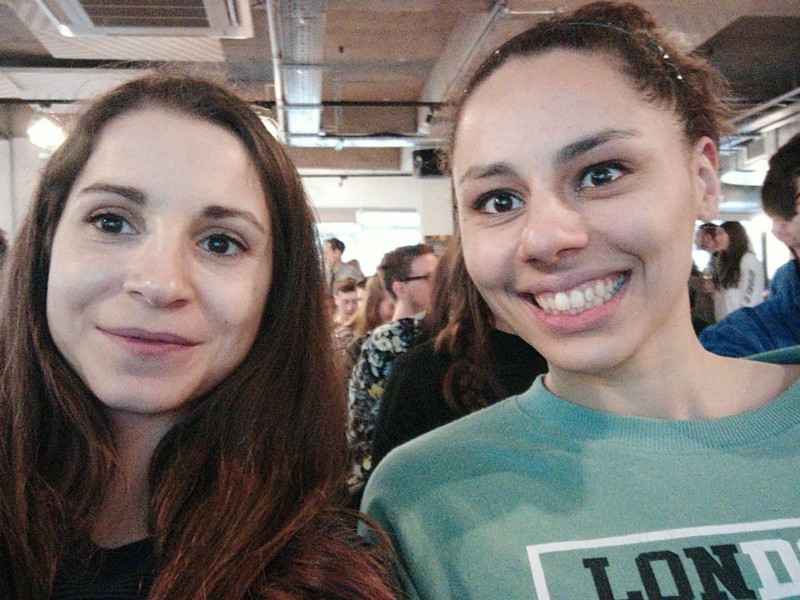
Rebecca: Ruth, you left a job you loved to work for Katerina. Why did you do it?
Ruth: I did love working at JustGiving, it was the perfect first engineering role for me, I was surrounded by people who had lots of experience and I learnt lots! I was inspired by the organisation’s mission to support charities, nonprofits and individuals through crowdfunding.
However, six months in, JustGiving was bought by an American company and it was obvious there would be a lot of changes over the next year or so. I don’t think that was necessarily a bad thing and it didn’t really bother me much but I also knew that I wanted to move on from my role as a junior developer at some point. So when Katerina asked me about working for Personably it was an opportunity I couldn’t refuse.
Rebecca: Tell me about the transition from large organisation to first employee at a small startup.
Ruth: The main difference between a large organisation and a small startup is how quickly things move. In a large organisation, it can take a long time for things to get to a final decision but in a small early-stage startup things tend to move more quickly.
Rebecca: What’s an example of something that moved more quickly at Personably than at JustGiving?
Ruth: Literally any feature release! At JustGiving the first project I worked on took two months to be released, and the second hadn’t even been released by the time I left - and I’d been working on it for six months. At Personably, we do small projects, and release them quickly.
Katerina: For example, Ruth rebuilt our entire home page using new designs in two, three weeks tops. We try to release things quickly and get people to try them out, so we can collect feedback and iterate! Otherwise you can spend a long time building things that you then have to scrap as they’re not what your customers need.
Rebecca: Katerina, tell me why you made Ruth your first hire.
Katerina: Because she’s great! We’d worked together for the best part of a year (and lived together at one point) so I knew we worked well together. I’m building this company and I have big plans for it, and I knew Ruth well enough to know she’d be up for it. She’s always really positive and never scared by problems being difficult to solve. And after I saw how well she dealt with the unpredictability of our freelance work, I was confident she could handle the uncertainty of a start-up. Plus, she’s always been a better developer than me!
Also, I don’t directly manage Ruth, as my co-founder, Lewis, is the head of her team, so it still feels like we’re peers!
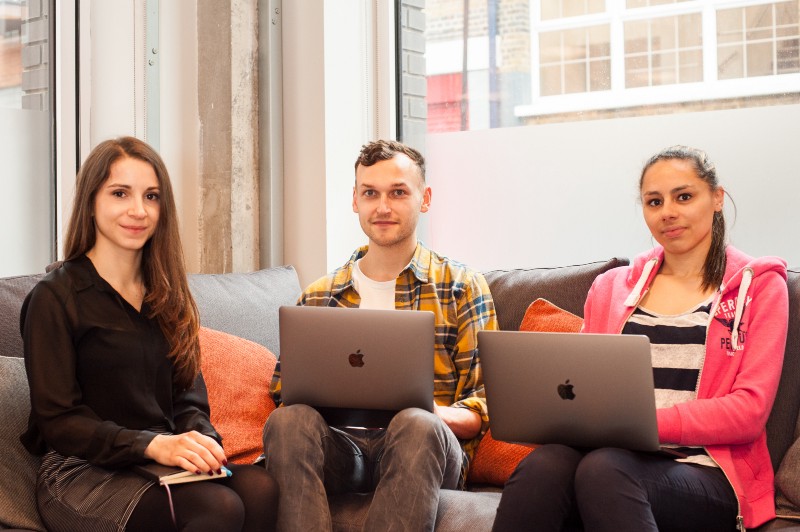
Ruth: It’s nice going to work for someone you’ve already worked with before, because you know how they work, and, at least in our case, there are no surprises.
Rebecca: Katerina, you’ve been an employee, a freelancer, and now your own boss. Tell me about this journey.
Katerina: They all contributed to where I am now! Being an employee at a high-growth start-up was a great experience, I had a lot of responsibility early on and built my network in London tech through it. Freelancing was my first experience of finding work for myself, managing a project and having to be fully responsible for its delivery. I also got to see how other founders went about launching their businesses.
Personably now with a team of six, venture capital investment and paying customers is very different to the first few months when it was Lewis and I trying to build something that we thought might be useful someday. We’ve got a lot more responsibility to our customers, team and investors so it’s a lot more like a real job - just higher stakes. It’s exciting though!
Rebecca: Katerina, tell me more about your responsibilities as CEO. What do you most enjoy? What’s the toughest part?
Katerina: I’m responsible for hiring, sales, investment and anything marketing related. I most enjoy seeing the awesome team we’ve hired do the things we’ve hired them to work on better than Lewis or I could. I also really like speaking to happy customers and people who we’re saving hours of time!
My job changes approximately every three months as the company changes and the team evolves. It means I never feel completely at ease with whatever problem I’m working on as often it’s for the first time! I like the uncertainty but it means you never feel like you’re smashing it. I need to get better at reflecting on what we’re doing well and celebrating those things. I think it’s my personality but I’m constantly pushing forward to what next — once I become an expert at something it means I’m too focused on it and I need to hire someone else to do it!
Rebecca: I imagine working at a startup doesn’t leave you with a lot of free time, but tell me about your interests outside of work/tech.
Ruth: I’ve recently just bought a house! So for the last 3 - 4 months every single bit of my time outside of work has been spent doing that!
Katerina: Trying out all the different pizza places in Shoreditch? My current favourite is HomeSlice!
To learn more about the Founders and Coders tuition-free training programme, and to read more interviews with our graduates, visit www.foundersandcoders.com
